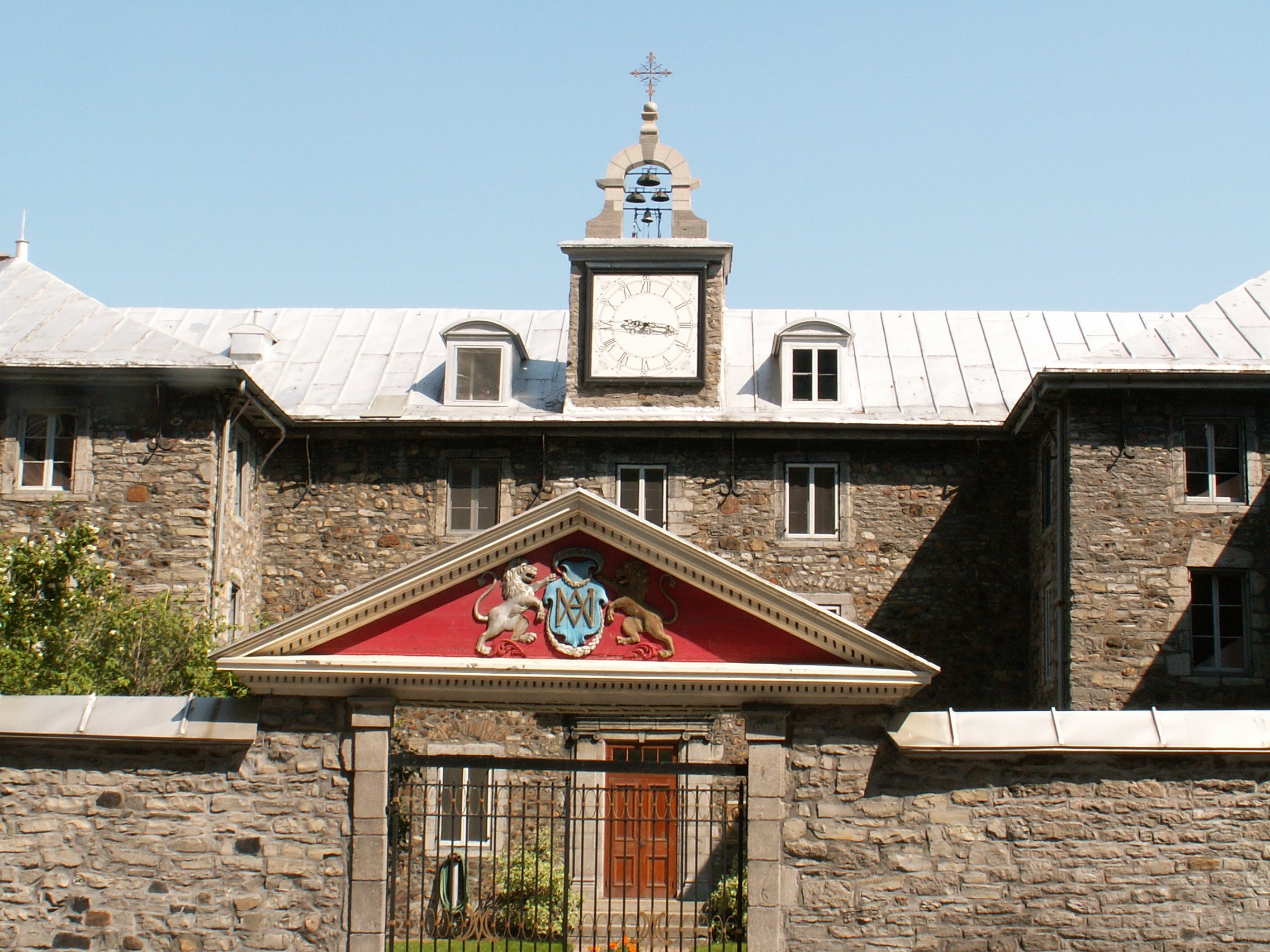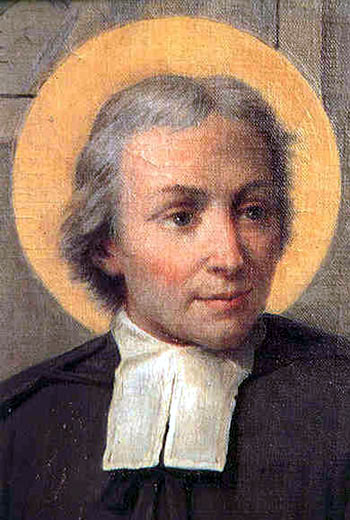|
Pierre-Louis Billaudèle
Pierre-Louis Billaudèle (20 November 1796 – 19 October 1869) was a priest from, and educated in, France who spent over 30 years of his service in Canada. Billaudèle received extensive education and religious training and became an educator as the director of the Petit Séminaire de Charleville, where he had studied. He became a Sulpician there during his tenure. He moved from there to the Grand Séminaire de Clermont-Ferrand where he spent a number of years before accepting an appointment to Montreal. Pierre-Louis arrived in Canada in 1837 with two other Sulpician priests and the initial four Canadian members of a Roman Catholic religious teaching congregation, the Brothers of the Christian Schools The De La Salle Brothers, officially named the Institute of the Brothers of the Christian Schools (; ; ) abbreviated FSC, is a Catholic lay religious congregation of pontifical right for men founded in France by Jean-Baptiste de La Salle (16 .... He was soon made the dir ... [...More Info...] [...Related Items...] OR: [Wikipedia] [Google] [Baidu] |
Society Of Saint-Sulpice
The Society of Priests of Saint-Sulpice (; PSS), also known as the Sulpicians, is a society of apostolic life of Pontifical Right for men, named after the Church of Saint-Sulpice, Paris, where it was founded. The members of the Society add the nominal letters PSS after their names to indicate membership in the Congregation. Typically, priests become members of the Society of the Priests of St. Sulpice only after ordination and some years of pastoral work. The purpose of the society is mainly the education of priests and to some extent parish work. As their main role is the education of those preparing to become priests, Sulpicians place great emphasis on the academic and spiritual formation of their own members, who commit themselves to undergoing lifelong development in these areas. The Society is divided into three provinces, operating in various countries: the Province of France, Canada, and the United States. In France The Society of Priests of Saint Sulpice was founded in F ... [...More Info...] [...Related Items...] OR: [Wikipedia] [Google] [Baidu] |
Montreal
Montreal is the List of towns in Quebec, largest city in the Provinces and territories of Canada, province of Quebec, the List of the largest municipalities in Canada by population, second-largest in Canada, and the List of North American cities by population, ninth-largest in North America. It was founded in 1642 as ''Fort Ville-Marie, Ville-Marie'', or "City of Mary", and is now named after Mount Royal, the triple-peaked mountain around which the early settlement was built. The city is centred on the Island of Montreal and a few, much smaller, peripheral islands, the largest of which is Île Bizard. The city is east of the national capital, Ottawa, and southwest of the provincial capital, Quebec City. the city had a population of 1,762,949, and a Census geographic units of Canada#Census metropolitan areas, metropolitan population of 4,291,732, making it the List of census metropolitan areas and agglomerations in Canada, second-largest metropolitan area in Canada. French l ... [...More Info...] [...Related Items...] OR: [Wikipedia] [Google] [Baidu] |
Brothers Of The Christian Schools
The De La Salle Brothers, officially named the Institute of the Brothers of the Christian Schools (; ; ) abbreviated FSC, is a Catholic lay religious congregation of pontifical right for men founded in France by Jean-Baptiste de La Salle (1651–1719), now based in Rome, Italy. The De La Salle Brothers are also known as the Christian Brothers (sometimes by Lasallian organisations themselves), French Christian Brothers, or Lasallian Brothers. The Lasallian Christian Brothers are distinct from the Congregation of Christian Brothers, often also referred to as simply the Christian Brothers, or Irish Christian Brothers. The Lasallian Brothers use the post-nominal abbreviation FSC to denote their membership of the order, and the honorific title Brother, abbreviated "Br." The Lasallian order stated that the Institute had 2,883 Brothers, who helped in running 1,154 education centers in 78 countries with 1,160,328 students, together with 107,827 teachers and lay associates. Summary ... [...More Info...] [...Related Items...] OR: [Wikipedia] [Google] [Baidu] |
Joseph-Alexandre Baile
Joseph-Alexandre Baile (19 April 1801 – 31 July 1888) was a Sulpician priest and administrator of seminaries in Montreal. Baile was often in conflict with Joseph-Vincent Quiblier, the superior of the Sulpicians in Canada. He also opposed splitting the Notre-Dame parish of Montreal, and verbally fought with Ignace Bourget about that issue to such an extent that Catholic officials in Rome ended up having to settle the matter themselves by decree. Baile was also a spiritual guide for the Grey Nuns, and helped establish a new seminary in the town of Oka. He retired in 1881 and died in Montreal. Early life Baile was born on 19 April 1801 in Saint-Genest-de-Beauzon, France. He studied with the Basilians, then entered a Sulpician novitiate in 1823. Two years later, he was sent to Canada and ordained a priest in October 1826. Teaching career In 1827, Baile became a professor at Petit Séminaire de Montréal, teaching in the rhetoric section of the classics. From 1830 to ... [...More Info...] [...Related Items...] OR: [Wikipedia] [Google] [Baidu] |
Joseph-Vincent Quiblier
Joseph-Vincent Quiblier (26 June 1796 – 12 September 1852) was a Roman Catholic priest involved in Sulpician The Society of Priests of Saint-Sulpice (; PSS), also known as the Sulpicians, is a society of apostolic life of Pontifical Right for men, named after the Church of Saint-Sulpice, Paris, where it was founded. The members of the Society add the ... educational endeavors in Canada. Born in France, Quiblier moved to Montreal in 1825 with Joseph-Alexandre Baile and almost immediately became involved as a Sulpician educator at the Petit Séminaire de Montréal. Although he was young and poorly trained, there was a great need to fill teaching positions at the seminary. By 1828, he was the director there and seems to have had the confidence of the French Canadian Sulpicians. However, this group appears to have been in conflict with the rest of Catholic community including Archbishop Bernard-Claude Panet. Quiblier became the superior of the Séminaire de Saint-Sulpice in ... [...More Info...] [...Related Items...] OR: [Wikipedia] [Google] [Baidu] |
19th-century Canadian Roman Catholic Priests
The 19th century began on 1 January 1801 (represented by the Roman numerals MDCCCI), and ended on 31 December 1900 (MCM). It was the 9th century of the 2nd millennium. It was characterized by vast social upheaval. Slavery was abolished in much of Europe and the Americas. The First Industrial Revolution, though it began in the late 18th century, expanded beyond its British homeland for the first time during the 19th century, particularly remaking the economies and societies of the Low Countries, France, the Rhineland, Northern Italy, and the Northeastern United States. A few decades later, the Second Industrial Revolution led to ever more massive urbanization and much higher levels of productivity, profit, and prosperity, a pattern that continued into the 20th century. The Catholic Church, in response to the growing influence and power of modernism, secularism and materialism, formed the First Vatican Council in the late 19th century to deal with such problems and confirm ce ... [...More Info...] [...Related Items...] OR: [Wikipedia] [Google] [Baidu] |
Sulpicians
The Society of Priests of Saint-Sulpice (; PSS), also known as the Sulpicians, is a society of apostolic life of Pontifical Right for men, named after the Church of Saint-Sulpice, Paris, where it was founded. The members of the Society add the nominal letters PSS after their names to indicate membership in the Congregation. Typically, priests become members of the Society of the Priests of St. Sulpice only after ordination and some years of pastoral work. The purpose of the society is mainly the education of priests and to some extent parish work. As their main role is the education of those preparing to become priests, Sulpicians place great emphasis on the academic and spiritual formation of their own members, who commit themselves to undergoing lifelong development in these areas. The Society is divided into three provinces, operating in various countries: the Province of France, Canada, and the United States. In France The Society of Priests of Saint Sulpice was founded in F ... [...More Info...] [...Related Items...] OR: [Wikipedia] [Google] [Baidu] |
1796 Births
Events January–March * January 16 – The first Dutch (and general) elections are held for the National Assembly of the Batavian Republic. (The next Dutch general elections are held in 1888.) * February 1 – The capital of Upper Canada is moved from Newark, Upper Canada, Newark to York, Upper Canada, York. * February 9 – The Qianlong Emperor of China abdicates at age 84 to make way for his son, the Jiaqing Emperor. * February 15 – French Revolutionary Wars: The Invasion of Ceylon (1795) ends when Johan van Angelbeek, the Batavian Republic, Batavian governor of Ceylon, surrenders Colombo peacefully to British forces. * February 16 – The Kingdom of Great Britain is granted control of Ceylon by the Dutch. * February 29 – Ratifications of the Jay Treaty between Great Britain and the United States are officially exchanged, bringing it into effect.''Harper's Encyclopaedia of United States History from 458 A. D. to 1909'', ed. by Benson John Lossing and, Woodrow Wils ... [...More Info...] [...Related Items...] OR: [Wikipedia] [Google] [Baidu] |
1869 Deaths
Events January * January 3 – Abdur Rahman Khan is defeated at Tinah Khan, and exiled from Afghanistan. * January 5 – Scotland's second oldest professional football team, Kilmarnock F.C., is founded. * January 20 – Elizabeth Cady Stanton is the first woman to testify before the United States Congress. * January 21 – The P.E.O. Sisterhood, a philanthropic educational organization for women, is founded at Iowa Wesleyan College in Mount Pleasant, Iowa. * January 27 – The Republic of Ezo is proclaimed on the northern Japanese island of Ezo (which will be renamed Hokkaidō on September 20) by remaining adherents to the Tokugawa shogunate. February * February 5 – Prospectors in Moliagul, Victoria, Australia, discover the largest alluvial gold nugget ever found, known as the "Welcome Stranger". * February 20 – Ranavalona II, the Merina Queen of Madagascar, is baptized. * February 25 – The Iron and Steel Institute is formed in Lo ... [...More Info...] [...Related Items...] OR: [Wikipedia] [Google] [Baidu] |





